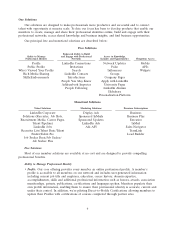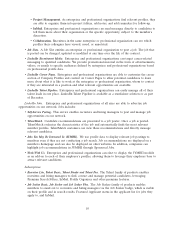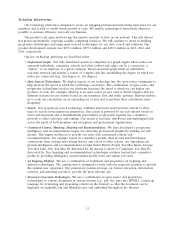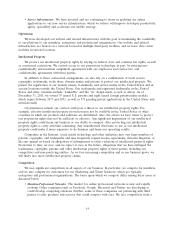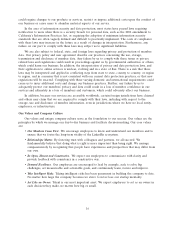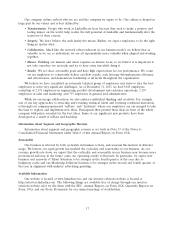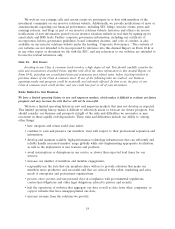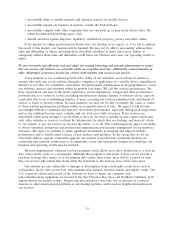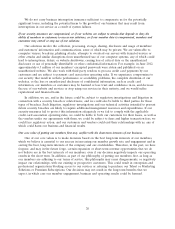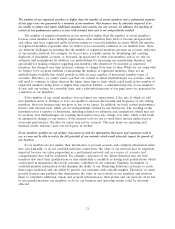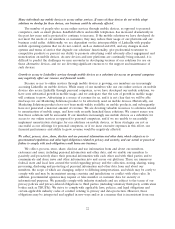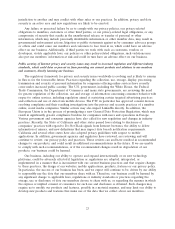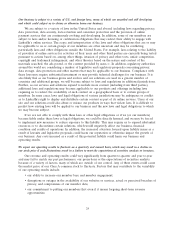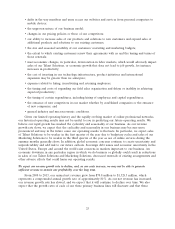LinkedIn 2013 Annual Report Download - page 17
Download and view the complete annual report
Please find page 17 of the 2013 LinkedIn annual report below. You can navigate through the pages in the report by either clicking on the pages listed below, or by using the keyword search tool below to find specific information within the annual report.number of smaller companies in international markets, such as Xing in German-speaking regions
and Viadeo in France, that provide online professional networking solutions, as well as Internet
companies in the customer relationship management market. Additionally, we compete against
smaller companies that focus on groups of professionals within a specific industry or vertical. Our
competitors may announce new products, services or enhancements that better address changing
industry standards or the needs of members and customers, such as mobile access. Any such
increased competition could cause pricing pressure, loss of market share or decreased member
engagement, any of which could adversely affect our business and operating results. Internet search
engines could also change their methodologies in ways that adversely affect our ability to optimize
our page rankings within their search results.
•Enterprises and Professional Organizations-Talent Solutions. With respect to our Talent Solutions, we
compete with established online recruiting companies, such as Monster, CareerBuilder, and
Indeed.com (owned by Recruit.net), talent management companies and larger companies that are
focusing on talent management and human resource services, such as Oracle, SAP and IBM, and
traditional recruiting firms. Additionally, other companies, including newcomers to the recruiting
industry, may partner with Internet companies, including social networking companies, to provide
services that compete with our solutions, either on their own or as third party applications. If the
efficiency and usefulness of our products to enterprises and professional organizations do not
continue to exceed those provided by competitors, we will not be able to compete successfully.
These factors are influenced by the number and engagement of our members.
•Enterprises and Professional Organizations-Marketing Solutions. With respect to our Marketing
Solutions, we compete with online and offline outlets that generate revenue from advertisers and
marketers. To the extent competitors are better able to provide customers with cost-effective access
to attractive demographics, either through new business models or increased user volume, we may
not be successful in retaining our existing advertisers or attracting new advertisers.
Additionally, other companies that provide content for professionals could develop more compelling
offerings that compete with our Premium Subscriptions and adversely impact our ability to sell and renew
subscriptions to our members. Finally, we are developing our sales solutions products and we may not be
able to compete effectively in this area.
We believe that we have competitive strengths that position us favorably in our markets. However,
our industry is evolving rapidly and is becoming increasingly competitive. Larger and more established
companies may focus on professional networking and could directly compete with us. Smaller companies
could also launch new products and services that we do not offer and that could gain market acceptance
quickly.
Government Regulation
We are subject to a number of foreign and domestic laws and regulations that affect companies
conducting business online, many of which are still evolving and could be interpreted in ways that could
harm our business. In the United States and abroad, laws relating to the liability of providers of online
services for activities of their users and other third parties are currently being tested by a number of
claims, including actions based on invasion of privacy and other torts, unfair competition, copyright and
trademark infringement, and other theories based on the nature and content of the materials searched,
the ads posted, or the content provided by users. Any court ruling or other governmental action that
imposes liability on providers of online services for the activities of their users and other third parties
could harm our business. In addition, rising concern about the use of social networking technologies for
illegal conduct, such as the unauthorized dissemination of national security information, money laundering
or supporting terrorist activities, may in the future produce legislation or other governmental action that
15



